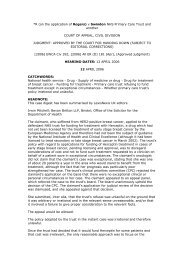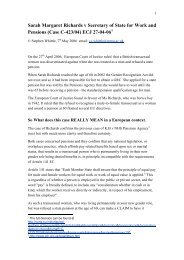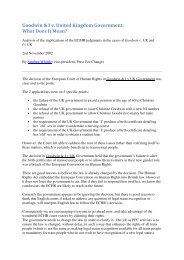Transgender EuroStudy â Legal Survey and Focus ... - ILGA Europe
Transgender EuroStudy â Legal Survey and Focus ... - ILGA Europe
Transgender EuroStudy â Legal Survey and Focus ... - ILGA Europe
Create successful ePaper yourself
Turn your PDF publications into a flip-book with our unique Google optimized e-Paper software.
33 April 2008<br />
Romania: International influences are currently driving healthcare reforms in two major areas,<br />
primary care <strong>and</strong> health insurance (Vladescu et al, 2000). Frequent changes in Romanian political <strong>and</strong><br />
managerial leadership have resulted in a low degree of success in healthcare reforms (Arnaudova,<br />
2006). At present, the National Health Insurance Fund (NHIF) exists as a mix of social insurance <strong>and</strong><br />
public management models in a system that is almost exclusively owned by the State. Health<br />
insurance is m<strong>and</strong>atory <strong>and</strong> is funded through contributions linked to payroll taxes or, in cases where<br />
no employment based contributions are available, funds are provided to the NHIF from the State<br />
budget. Services are contracted from healthcare providers from funds at the district level. The World<br />
Health Organization recommends that further reforms in mental health are needed (Arnaudova, 2006).<br />
United Kingdom: Since 1999, public healthcare organisation in the United Kingdom has<br />
been devolved into the autonomous National Health Services (NHS) of Engl<strong>and</strong>, Scotl<strong>and</strong>, Wales, <strong>and</strong><br />
Northern Irel<strong>and</strong>. Each service has an independent economic <strong>and</strong> managerial structure, but remains<br />
reliant on the Parliament in Westminster for funding. Founded in 1948, the NHS was to be universal,<br />
comprehensive, <strong>and</strong> available to all equally on the basis of need. Over the past fifty-nine years, the<br />
NHS has grown to become the largest organisation in <strong>Europe</strong> (Department of Health, 2007).<br />
Healthcare under the NHS is funded by general taxation <strong>and</strong> provided free at the point of delivery for<br />
residents. In Engl<strong>and</strong>, by far the largest system of the four, management responsibility for healthcare<br />
lies with the Department of Health <strong>and</strong> decisions about service delivery <strong>and</strong> local priority setting fall<br />
to Strategic Health Authorities <strong>and</strong>, more locally, to Primary Care Trusts. Whilst in previous years the<br />
NHS was a relatively self-sufficient <strong>and</strong> insular public system, more recent reforms have introduced<br />
market mechanisms <strong>and</strong> increased managerialism to the health service (Talbot-Smith <strong>and</strong> Pollock,<br />
2006). These trends are set to continue as the government looks for ways to improve the<br />
responsiveness <strong>and</strong> cost-effectiveness of the system, whilst maintaining its new commitment to a<br />
‘patient-centred’ NHS.








